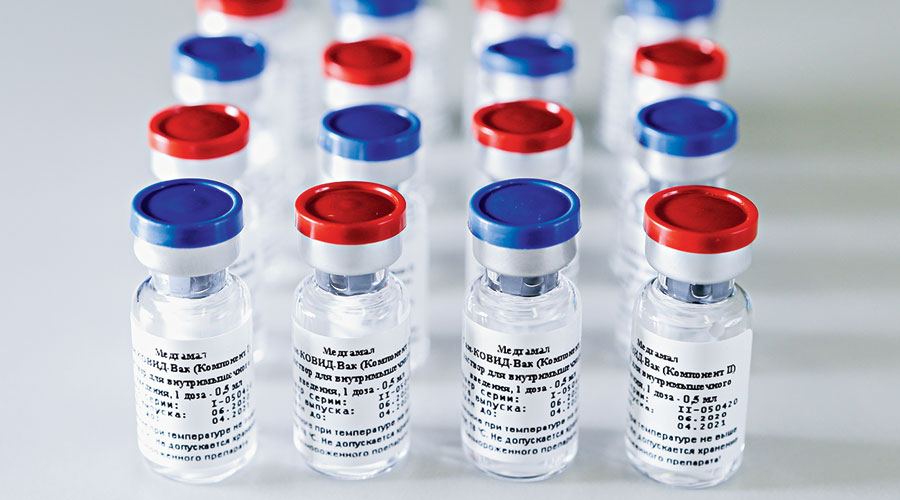
Covid: Indian vaccine clears monkey hurdle
Scientists caution that the vaccine’s potential to protect humans from the virus will only be assessed through large-scale efficacy
 | TT | New Delhi | 12.09.20 : A homegrown Indian vaccine candidate has successfully protected rhesus monkeys from the novel coronavirus disease, government and industry scientists have said, describing its immune response and protective efficacy as “remarkable”.
| TT | New Delhi | 12.09.20 : A homegrown Indian vaccine candidate has successfully protected rhesus monkeys from the novel coronavirus disease, government and industry scientists have said, describing its immune response and protective efficacy as “remarkable”.The vaccine induced a strong immune response and protected monkeys from the coronavirus infection and associated lung disease, a 45-member research team from the Indian Council of Medical Research, Hyderabad-based vaccine maker Bharat Biotech and collaborating institutions has said.
The vaccinated monkeys showed no evidence of pneumonia, the scientists said in the first research paper from India on the outcome of “animal challenge” studies designed to find out whether a vaccine candidate can protect animals from the disease after exposure to the infection.
The paper is not peer-reviewed yet but is posted on Research Square, an academic preprint server.
The vaccine candidate named BBV152, jointly developed by the ICMR and Bharat Biotech, is based on an inactivated or killed version of SARS-CoV-2, the virus that causes Covid-19. It is currently under clinical trials on healthy volunteers at 12 sites in India for safety and early efficacy assessment.
The clinical trials had started in mid-July after preliminary studies on animals had established BBV152 as safe and capable of generating an immune response. But the research community had been waiting for the results of the challenge studies that examine the capacity of the candidate to protect animals.
Scientists at the Peking Union Medical College in Beijing, China, had in April this year shown through lab studies that rhesus macaques are “the most suitable” animal model for Covid-19 after assessing three species of monkeys.
Since then, other vaccine candidates — the one developed by Oxford University scientists and another from the US-based biotechnology company Moderna — have been assessed on rhesus macaques to study their protective efficacy.
In the ICMR-Bharat study, scientists divided 20 macaques into four groups — three males, two females in each group. Monkeys in one group received a placebo, or sham, injection, while monkeys in the other groups received three versions of BBV152 slightly differing in their dose or composition.
All monkeys received either two doses of the placebo injection or the vaccine candidate.
Two weeks after the second dose, the scientists exposed — challenged — the monkeys with SARS-CoV-2, depositing large amounts of the virus into the animals’ windpipes and both their nostrils.
Seven days later, the scientists detected SARS-CoV-2 RNA, or genetic material, in the monkeys in the placebo group but the vaccinated monkeys had no detectable viral RNA. The scientists say this shows the ability of the vaccine to curb viral replication in the upper respiratory tract.
Viral genetic material was also absent in fluid samples from the lungs of the vaccinated monkeys, suggesting that the vaccine candidate had hindered virus replication and enabled its clearance from the lower respiratory tract.
Subsequent lung examinations revealed moderate to severe disease in three and mild disease in two monkeys in the placebo group. The vaccinated monkeys had “significantly lower” disease burden compared to the placebo group, the scientists said.
The study has established that a two-dose vaccination regimen using a 3 microgram dose of the vaccine candidate induces a significant immune response and effective protection in animals challenged with SARS-Cov-2, the researchers said.
“The results bolster our confidence in this candidate,” Samiran Panda, the chief of epidemiology division at the ICMR and member of a national task force on Covid-19, told The Telegraph.
Bharat Biotech’s managing director and scientist-turned-entrepreneur Krishna Ella said the greater protective effect observed with the 3 microgram dose than with a 6 microgram dose was a surprise.
“This tells us that the immune response has to be just right for most effective protection — neither too strong, nor too weak,” Ella said.
But scientists caution that the vaccine’s potential to protect humans from the coronavirus will only be assessed through large-scale efficacy or so-called phase 3 studies that will follow the safety and early efficacy studies currently underway.
In phase 3 studies, several thousands of healthy volunteers will receive the vaccine candidate. The candidate will be viewed as effective if significantly fewer vaccinated volunteers develop Covid-19 compared with unvaccinated volunteers.

0 Response to "Covid: Indian vaccine clears monkey hurdle"
Post a Comment
Disclaimer Note:
The views expressed in the articles published here are solely those of the author and do not necessarily reflect the official policy, position, or perspective of Kalimpong News or KalimNews. Kalimpong News and KalimNews disclaim all liability for the published or posted articles, news, and information and assume no responsibility for the accuracy or validity of the content.
Kalimpong News is a non-profit online news platform managed by KalimNews and operated under the Kalimpong Press Club.
Comment Policy:
We encourage respectful and constructive discussions. Please ensure decency while commenting and register with your email ID to participate.
Note: only a member of this blog may post a comment.